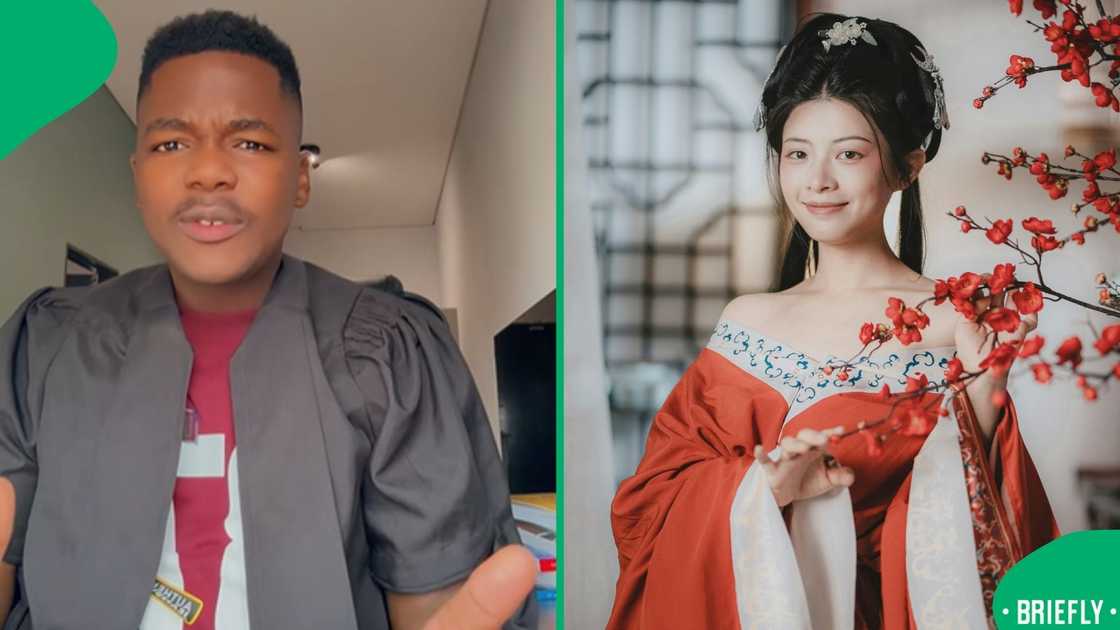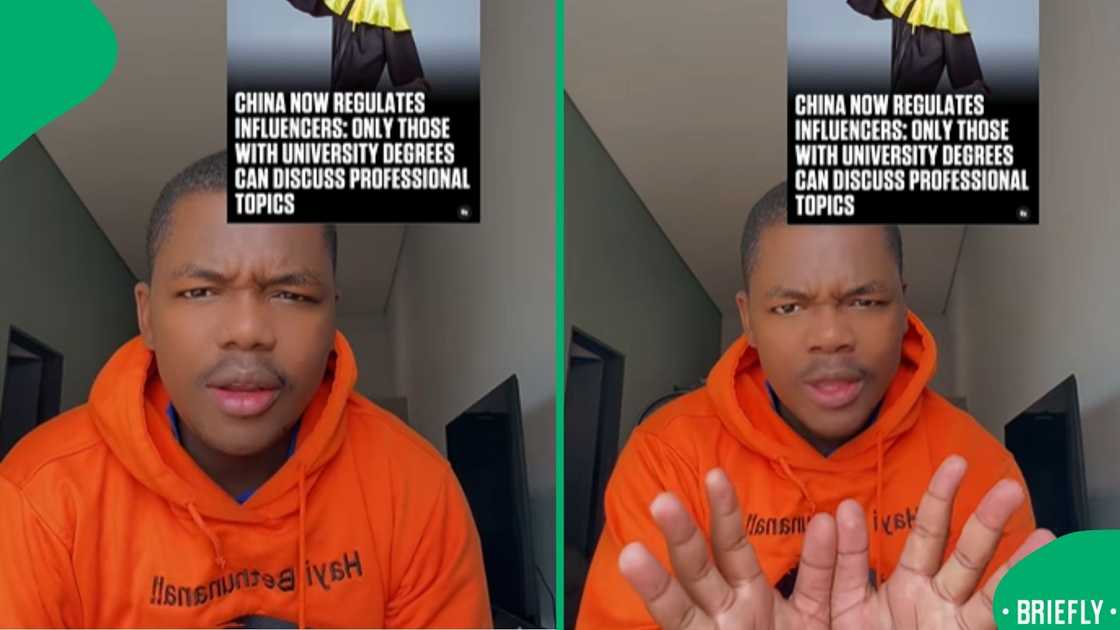SA Reacts to China’s New Influencer Law That Only Qualified People Can Discuss Professional Topics
- China’s new influencer law drew strong reactions online, with South Africans discussing its potential benefits and drawbacks
- Many users supported the idea of requiring qualifications for professional content creators to improve accountability
- The conversation highlighted growing concerns around misinformation and how online regulations could evolve in future
- Briefly News spoke to Zuko Ndzakana and Slimkat Matenda, both popular influencers, to get insights for aspiring content creators navigating the realities of starting a career in the digital space
South Africans shared mixed views after learning about China’s new influencer law, debating whether such strict content rules would work locally.

Source: TikTok
A TikTok user @giftbozekana posted a video on 27 October 2025 discussing China’s newly implemented influencer law, which immediately set social media abuzz. In just a few hours, the clip went viral with thousands of likes and comments from South Africans sharing their views. Many said the law makes sense and wished similar measures existed in South Africa to promote accountability online. The video came shortly after China’s Cyberspace Administration enforced a regulation that took effect on 25 October, stating that anyone producing content on professional subjects such as medicine, law, education, or finance must hold qualifications in those areas.

Read also
A motorist in South Africa captured a huge suspected molesnake crossing the road, sparking reactions online
The purpose of the new influencer law is to prevent the spread of misinformation and protect the public from unverified or misleading advice. The Cyberspace Administration of China explained that creators must now show formal proof of expertise, such as a degree, licence, or certificate, before publishing content in restricted fields. Popular platforms, including Douyin, Weibo, and Bilibili, are required to verify creators’ credentials and ensure that videos discussing regulated topics include proper citations or disclaimers. While the policy has sparked mixed reactions globally, it reflects China’s growing effort to control how professional knowledge is shared online.
Online creators face new restrictions
The video, shared by content creator @giftbozekana, received over 3,000 likes and multiple comments within hours as it trended across social platforms. South Africans engaged heavily in the comment section, debating whether such a law could benefit their own country. Some users agreed that limiting unqualified opinions on sensitive matters could reduce misinformation, while others worried the approach could stifle creativity and open dialogue.. The post quickly became one of the most discussed clips of the day, especially among users interested in media regulation and digital ethics.
PAY ATTENTION: Briefly News is now on YouTube! Check out our interviews on Briefly TV Life now!
In the following hours, discussions continued to grow, with many users applauding the logic behind China’s decision. The idea that influencers should be properly trained before giving professional advice resonated with people frustrated by misleading content. Others viewed it as a wake-up call for content creators to take their influence more seriously. The video not only sparked a wave of online debate but also gave South Africans a chance to reflect on their own social-media standards.

Read also
South African woman amazed Mzansi after teaching a Chinese child to speak isiZulu in viral clip
Becoming a content creator can be challenging, especially when starting out. Success often requires persistence, passion, and patience, rather than focusing solely on financial gain. Growing a following can take time, and creators may need to rely on networks and connections initially to get noticed. Zuko Ndzakana, content creator, said:
“The advice I would give emerging content creators would be don’t do it for money because you will be highly disappointed. The payment part should be a cherry on top because you might not make money for two years straight while fighting and putting in effort. Normally, your channel would grow because you have famous friends, and people will get to experience you through a friend and want to follow you, while for some of us, convincing people to watch a 30-minute video from you and they don’t know you is hard."
Slimkat shared his thoughts with Briefly News on China’s controversial new influencer law, weighing both the benefits and the possible downsides for digital creators. Slimkat believes the law has its advantages, especially when it comes to curbing misinformation online.
"I think China’s new law has both pros and cons, but more on the pros in my opinion. The law helps with misinformation. We’re at a stage where people use the internet for updates on what’s happening, so it’s in our interest to have less misinformation. Too many people talk about topics they don’t really understand, and that shouldn’t be the case.”

Read also
A South African man built thriving culinary school after being rejected from one years earlier
He also pointed out that while the law may have good intentions, it restricts creators who are knowledgeable but don’t hold formal qualifications.
“There are creators who don’t hold degrees in certain fields but are still quite informative. A law like this restricts their freedom of expression, which is unfortunate. It does limit creators, but for what some might call the greater good."
Slimkat expressed concern that similar restrictions could harm influencer content in South Africa, where traditional media is often seen as biased or selective.
“In South Africa, many news platforms are controlled and propaganda-led, so people turn to independent voices like podcasts. A law like this would push us back to traditional media, which often picks what it wants to report. Influencers who cover current affairs would lose opportunities to grow, even those who have built credibility through experience and honest reporting."
He concluded by saying that true credibility in media and content creation should be based on more than formal education.
“What defines credibility is more than just education; it’s experience, authenticity, and a genuine interest in researching and spreading correct information."

Read also
Mzansi shared concerns after a viral video warned about a possible rise in inflation for 2026

Source: TikTok
Here's what Mzansi had to say
Rirhandzu Shabane said:
“Education will always be the key to success.”
JemzLiving commented:
“Cries in diploma.”
Temosho said:
“Degreeeeeeeees!”
Academic Evolution said:
“Haii bethunana, let me go and study.”
User8212613259658 commented:
“Most of our influencers would never say anything.”
Yolah The Qween commented:
“So we never find ourselves in situations such as the Russian saga.”
Vuyokazi Saboshego said:
“As it should be!”
Shirin Shyno Thomas commented:
“Finally.”
Check out the TikTok video below:
3 Other Briefly News stories related to influencers
- An influencer shared his grocery haul from Shoprite under R400, which included a surprising variety of meats and essentials.
- A KwaZulu-Natal influencer shared a video revealing a hidden Durban store selling branded jeans for R300, chino shorts for R160 and denim shorts for R180.
- South African content creator and influencer Lungile Thabethe celebrated a major personal milestone.
Source: Briefly News

